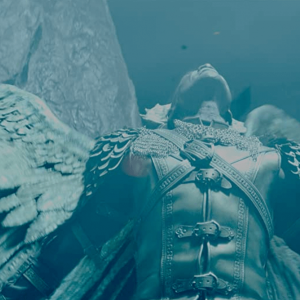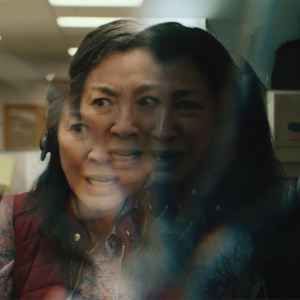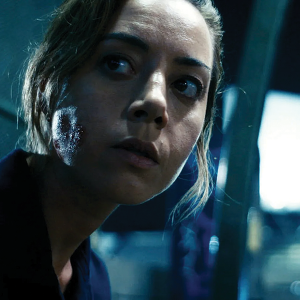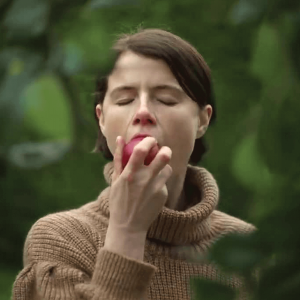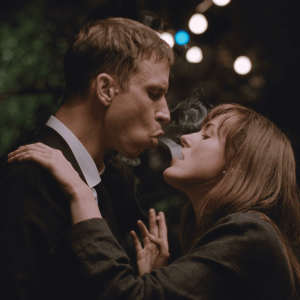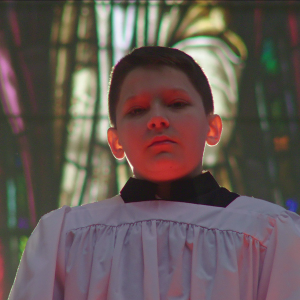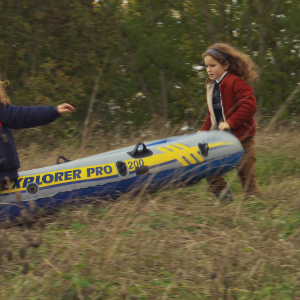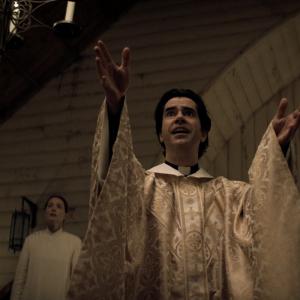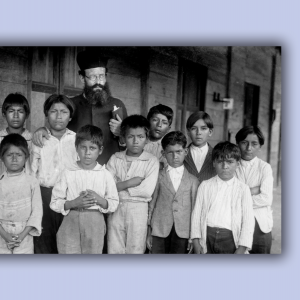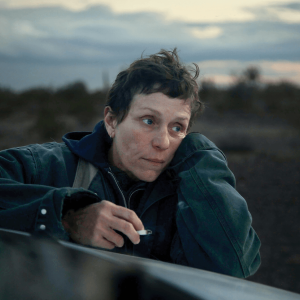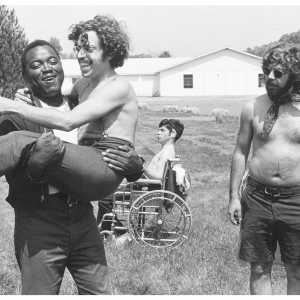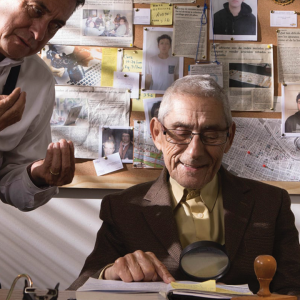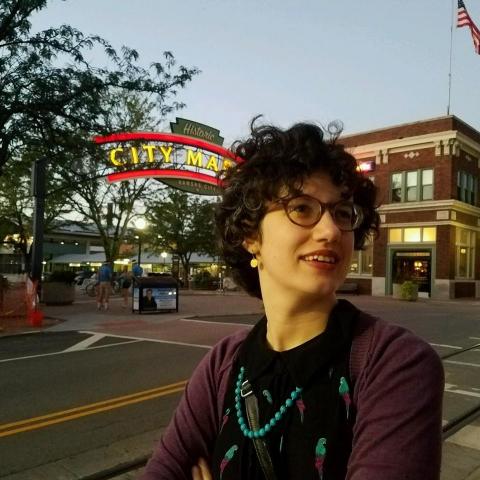
Abby Olcese (@abbyolcese) has been many things — a campus ministry leader at the University of Kansas, an English teacher in Prague, and an advertising assistant at Sojourners. These days, she’s a freelance writer based in Kansas.
Raised on a diet of Narnia, Bob Dylan records and Terry Gilliam movies, Abby is drawn to the weird, the nerdy, and the profoundly artsy corners of popular culture. She loves sharing this knowledge with others by writing about interesting new releases as well as lesser-known gems.
Abby is also passionate about the intersection of faith, social responsibility, and culture. She believes in the power of art to spark important conversations, inspire social change, and help people to better understand life in the kingdom of God.
When she’s not watching movies or writing things down, you can usually find Abby reading comic books or perusing the selection at her local record store.
Posts By This Author
Facing Our Ghosts of Unresolved Grief
‘The Eternal Daughter’ shows us how we can better carry unwelcome burdens.
IN HER POEM “Flare,” Mary Oliver writes about grief and the relationship between memory and reality, especially when it comes to parents. She writes: “My mother / was the blue wisteria, / my mother / was the mossy stream out behind the house, / my mother, alas, alas, / did not always love her life, / heavier than iron it was / as she carried it in her arms, from room to room.”
Our relationships with parents are shaped by our memories, what parents tell us about their lives, and what we come to understand about them. The Bible tells us to honor our father and mother, but we can never do that perfectly because we never fully know them. This becomes more poignant when those who raised us are no longer around.
Like Oliver’s poem, Joanna Hogg’s The Eternal Daughter (available on video on demand) captures this liminal, lonely feeling in an intensely personal way. Hogg’s semi-autobiographical film is a ghost story about memory, family, and the pull between the stories we know, the ones we don’t, and unresolved ways they differ.
Avoiding Capture in a Web of Misogyny
The Spider Killings happened more than 20 years ago, but the attitudes that enabled those murders remain frighteningly prevalent.
THE OPENING SCENE of Holy Spider is brutal. We see a woman — a sex worker — leave her child at home to go to work. Walking through Iran’s holy city of Mashhad, she stops at a public restroom to adjust her headscarf and apply bold lipstick. She goes on her first call of the night and does some opium. As she prepares to go home, a man approaches on a motorcycle. He offers her money. She joins him. Shortly after arriving at their destination, he strangles her.
Writer-director Ali Abbasi’s Holy Spider is a fictionalized account of Saeed Hanaei, known as the Spider Killer, who targeted female sex workers in Mashhad from 2000 to 2001. The film, which premiered at the 2022 Cannes Film Festival, examines the killer’s life and the process of capturing him, led by (fictionalized) female journalist Arezoo Rahimi (Zar Amir Ebrahimi).
‘The Devil Conspiracy’ Is Boring as Hell
Here’s the setup: A shadowy biotech conglomerate and a cabal of satanists (gasp!) are planning to release Lucifer from hell by… wait for it… stealing the linen cloth used to cover Christ’s body during his entombment, using it to clone Christ’s DNA, and then implanting it into a surrogate mother, allowing Lucifer to possess the fetus. The Devil Conspiracy is like a mix of Rosemary’s Baby, Demon Seed, and the surrogacy mix-up romcom The Switch.
Spirituality of the Multiverse
‘Everything Everywhere All at Once’ taps into relatable feelings about the paths not taken.
“THE SPIRITUAL LIFE, in other words, is not achieved by denying one part of life for the sake of another. The spiritual life is achieved only by listening to all of life and learning to respond to each of its dimensions wholly and with integrity.”
In this quote from Wisdom Distilled From the Daily: Living the Rule of St. Benedict Today, Joan Chittister writes about living a spiritually active existence that fully engages with our daily reality. She couldn’t have known it at the time, but Chittister might as well have been describing one of the biggest pop culture trends of the last few years: the multiverse.
The concept of multiple worlds and multiple versions of ourselves (some of whom live the life we secretly wish we had) has become ubiquitous across screens, from movies like Doctor Strange in the Multiverse of Madness and Spider-Man: No Way Home to TV shows like Rick and Morty and Doctor Who. Perhaps the example of multiverse storytelling to most successfully plumb emotional possibilities so far — listening to all of life and responding to its dimensions with integrity — is also one of 2022’s most surprising hits: the indie film Everything Everywhere All at Once.
Capitalism Isn't Much Better than the Criminal World
"Emily the Criminal" is the millennial version of classic gangster noir — and an indictment of our exploitative economy.
EMILY (AUBREY PLAZA) is caught in a vicious catch-22. She’s in deep student debt, but a criminal infraction keeps her from getting a job to pay down her balance. Emily’s stuck working catering gigs, and what little money she can set aside goes to her loan interest, practically ensuring she’ll never be able to get her head above water.
When a co-worker offers her a chance to make some extra cash, Emily jumps at the opportunity. It may be highly illegal, but what other choice does she have?
Writer/director John Patton Ford’s Emily the Criminal is a millennial version of classic gangster noir, with Plaza’s Emily drawn deeper into a criminal underworld where fast payout overrules ethics. Ford’s film never glamorizes Emily’s experiences, instead showing us a desperate person fed up with a world that gives her virtually no other choice but to break the law to survive.
Nathan Fielder’s Absurdly Profound Exploration of Forgiveness
As it turns out, the person who needed The Rehearsal most was Fielder himself. His interaction with Angela in the finale reveals that the whole enterprise is actually an exploration of the inevitable pain humans cause others, even when we’re not trying to, and our need for grace and self-forgiveness.
Learning to Live with "Men"
Right now, our lives seem to be all about sitting with painful, tangled questions. It makes sense that our art should be, too.
WHEN REVIEWING FILMS, especially from a faith-based angle, it’s natural to look for concrete messages. Most mainstream films tell three-act stories, and those typically include a tidy resolution that presents a perspective or moral. But film is also an art form, and great art is more interested in creating atmosphere and asking questions than providing answers—not unlike faith, which teaches us to pose unanswerable questions and to sit with uncertainty.
For those who like tidy narratives, filmmaker Alex Garland’s work can be frustrating. Garland’s films are concerned with big concepts, many related to the characters’ desire for control at the expense of their humanity and others’ lives. However, his films rarely answer the questions they pose, leaving room for viewer interpretation. For audiences willing to engage with art that lives in an in-between place, this can be a thrilling, sometimes visceral, experience.
Garland’s latest film, Men, is his most tonally upsetting and his most abstruse. In it, Harper (Jessie Buckley) rents a country manor as a space to emotionally recover from the violent death—a possible suicide—of her husband, James (Paapa Essiedu). Her idyllic solitude is disrupted by a series of men (all played by Rory Kinnear) who threaten her emotionally, psychologically, and physically. The men appear in various forms, including a patronizing older man, a vulgar child, a manipulative vicar, a macho policeman, and a naked, silent stalker.
The concept itself is clear; Men is about the act of male intrusion on the lives of women. But it’s the way the movie communicates the theme that creates questions Garland would rather ask than answer.
Embracing the Animal Within
"Turning Red's" fuzzy transfiguration is a relatable reminder that everyone's lives contain emotional (and sometimes embarrassing) balancing acts.
MEILIN LEE, the 13-year-old hero of Pixar’s Turning Red, has a lot on her shoulders. She’s maintaining perfect grades alongside responsibilities helping her mom, Ming (Sandra Oh), run Toronto’s oldest Chinese temple. She’s torn between her identities as a dutiful daughter and a socially active teenager. Oh, and she transforms into a giant red panda in times of strong emotion.
That last issue, it turns out, is genetic. Because of a deal made by an ancestor, the women of Meilin’s family all poof into red pandas when they’re angry, sad, or excited, a trait that emerges during puberty. The panda spirit can be contained through a ritual. Ming is desperate to keep her daughter’s red panda spirit under control. Meilin, however, isn’t sure she wants it subdued.
Directed and co-written by Chinese Canadian animator Domee Shi, Turning Red’s fuzzy transfiguration is a metaphor for real-life stressors.
‘The Worst Person in the World,’ Despite Its Title, Never Judges
Joachim Trier’s film explores the subtle changes of the soul and the experiences that define us all.
IN A 2001 lecture titled “Devotional Cinema,” filmmaker and film editor Nathaniel Dorsky broadly described devotional practice as “the interruption that allows us to experience what is hidden and to accept with our hearts our given situation.” Dorsky connected this definition to the experience of watching a movie, claiming, “It is alive as a devotional form,” allowing viewers to uncover truths about themselves and the world by watching someone else’s story. A movie doesn’t have to be experimental art, a heavy drama, or a religious epic to be a devotional experience. Often, the most profound stories are about the subtle changes of the soul over time and the experiences and relationships that define a person. We relate to them because, like a devotional practice, they help us reflect on our own lives and consider how we live in relation to others.
Joachim Trier’s The Worst Person in the World is one such film, following its protagonist, Julie (Renate Reinsve), from her late 20s to her early 30s. Trier places Julie as the main character of her own story, narrated to us as she lives it, changing careers, falling in love, breaking up, experiencing loss, and becoming wiser and more comfortable with herself as a result.
Survivors of Catholic Clergy Abuse Turn to Acting to Process Trauma
Robert Greene's 'Procession' demonstrates the restorative potential of creative expression.
IN WHISTLING IN the Dark: A Doubter’s Dictionary, Frederick Buechner writes of the power of art, “If we are to love our neighbors, before doing anything else we must see our neighbors. With our imagination as well as our eyes ... like artists, we must see not just their faces but the life behind and within their faces.” All art can be a sacred space to share an artist’s experiences and needs. At its very best, it can generate empathy and healing.
In the new Netflix documentary Procession, filmmaker Robert Greene works with adult survivors of sexual abuse by Catholic priests, as well as trauma-trained advocates and therapists. The six men featured in the film collaboratively create dramatic scenes to process physical, emotional, and spiritual traumas. Their journey highlights the value of supportive communities, and the restorative potential of creative expression.
Though directed by Greene, Procession is credited as “a film by” everyone involved. Top billing goes to the men whose stories the film highlights: Joe Eldred, Mike Foreman, Ed Gavagan, Dan Laurine, Michael Sandridge, and Tom Viviano. While Greene may be the one behind the camera, ownership of the film belongs to the subjects.
Home to Our Hallowed Memories
Grief, relationship, and sacred space in Céline Sciamma’s 'Petite Maman.'
OVER THE LAST year we’ve had to reconsider our definition of what makes a “sacred space.” When churches and temples closed due to the pandemic, our homes became places of worship for many of us.
This cemented what’s always been true: Sacred space is a fluid thing. It can be a place of deep personal meaning or shared memories with people we care about. A sacred space doesn’t even need to be a physical location. It could also be the spiritual space created whenever we’re with those we love or remember people we’ve lost.
Céline Sciamma’s tender film Petite Maman speaks to this. A little girl, Nelly (Joséphine Sanz) and her mother, Marion (Nina Meurisse), grieve the death of Marion’s mother and clean out Marion’s childhood home. Sciamma’s movie becomes a meditation on everyday sacred spaces, including those that can exist within mother-daughter relationships.
‘Midnight Mass’ Shows the Horrors of Co-Opted Faith
Midnight Mass is the latest from horror filmmaker Mike Flanagan (creator of The Haunting of Hill House and The Haunting of Bly Manor), who excels in slow-creeping, character-based horror. It’s also a project through which Flanagan, a former Catholic, processes his feelings about scripture, religion, and the church. As an artistic representation of someone deconstructing their faith, Midnight Mass employs horror tropes to explore the ways religion responds to pain, both in ways that heal and ways that destroy.
Jessica Chastain Has Wanted to Portray Tammy Faye for Years
A biopic about Tammy Faye Messner, better known as Tammy Faye Bakker, is ripe for caricature. That face, covered with a rainbow of lipstick, eyeliner, and mascara. That voice, with its exaggerated Upper Midwest accent. Those televangelism broadcasts, where puppet shows and hymns were followed by direct pleas for money from Tammy Faye and her first husband, Jim Bakker. She’s an easy figure to ridicule. But The Eyes of Tammy Faye, a new biopic that shares its name with Fenton Bailey and Randy Barbato’s 2000 documentary, blessedly avoids this trap.
Viewing the ‘Alien’ Franchise Through a Feminist Theology Lens
There's a lot in the movies for xenomorphs—and humans—to chew on.
WHEN AUTHOR AND film critic Sarah Welch-Larson was growing up, she wasn’t a horror movie fan. That started to change when, as a teenager, she had a fateful encounter with the James Cameron film Aliens on cable TV.
The movie’s hero, Ellen Ripley, played by Sigourney Weaver, “looked a lot like my mom and had a lot of the attitudes my mom has about some things,” Welch-Larson, who writes about faith and popular culture for the online publications Think Christian and Bright Wall/Dark Room, told Sojourners. “I was captivated by that character.” Two weeks later, Welch-Larson watched the first 1979 Alien movie, directed by Ridley Scott. It frightened her and she couldn’t get it out of her head.
Eventually Welch-Larson’s interest grew into a fascination with the series as a whole. Her new book, Becoming Alien: The Beginning and End of Evil in Science Fiction’s Most Idiosyncratic Film Franchise, looks at recurring themes of evil, greed, and destruction in the Alien films through the lens of theologian Catherine Keller’s 2002 book, The Face of the Deep: A Theology of Becoming, in which Keller examines the first two verses of Genesis.
“She writes a lot about God setting everything into relationship with each other. God’s saying there’s a relationship you have with the rest of the world and with other created beings around you,” Welch-Larson explains. “Once you start to deny those relationships, you’re saying they’re not as important as what God has created you to be, and Keller says that’s the source of evil.”
Crossing Cultural and Religious Barriers in ‘We Are Lady Parts'
Faith takes many forms.
NO MATTER YOUR racial, ethnic, spiritual, or geographic background, or where you fall on the gender spectrum, a vital part of adulthood is determining your identity—particularly in relationship to the community you grew up in. At some point, we all diverge from others’ opinions of us. Hopefully, we also find people who help us in our quest to define ourselves.
The Peacock series We Are Lady Parts, about an all-female, Muslim punk band, shows a group of characters who support each other on their individual journeys of identity, with their religion and larger community playing central roles. The series, created and written by Nida Manzoor, presents a diverse look at modern-day Muslim womanhood. Its themes also carry over into the broader experience of maturing alongside your faith, and what happens when your expression of belief conflicts with cultural expectations.
Lady Parts is fronted by the fierce feminist Saira (Sarah Kameela Impey). Earthy mom Bisma (Faith Omole) plays bass, and aggressive Ayesha (Juliette Motamed) is on drums. Momtaz (Lucie Shorthouse), often shown vaping through her niqab, is their manager. Saira decides the band needs a lead guitarist, eventually selecting Amina (Anjana Vasan), a painfully shy, tightly wound Ph.D. student.
The Sin of Shape-Shifting Supremacists
Reclaiming history in ‘Exterminate All the Brutes.’
IN 2016, RAOUL PECK'S documentary I Am Not Your Negro used the life and work of James Baldwin to explore the underlying truths of racism in U.S. society. Peck said that after making that film, “Baldwin had firebombed every known field of bigotry I knew and annihilated any attempt at deniability of the racist monster that lurks in corners of our societies.”
Processing that experience led Peck to his new, ambitious HBO documentary series Exterminate All the Brutes. In it, Peck expands on the themes of ignorance and resistance in our modern-day understanding of racism and on how our flawed historical understanding feeds those attitudes. Exterminate All the Brutes is also an essay film, with Peck, a Haitian immigrant, reflecting on his identity as a Black man who has lived in a variety of cultures and how that’s influenced his own art.
The series weaves voiceover and scripted dramatic scenes with information from groundbreaking works on European colonialism, Indigenous peoples, and racism—including Roxanne Dunbar-Ortiz’s An Indigenous People’s History of the United States, Michel-Rolph Trouillot’s Silencing the Past, and Sven Lindqvist’s Exterminate All the Brutes.
Hospitality Isn't Always About Sharing a Table
In ‛Nomadland’ it's about sharing each other.
THE LAST CHAPTER of Hebrews in the New Testament begins with a reminder of how to serve God and build a healthy community: “Do not neglect to show hospitality to strangers, for by doing that some have entertained angels without knowing it” (13:2). Biblical hospitality takes many forms, but it consistently involves selfless sharing of space, resources, and—perhaps most importantly—attention. To share part of your life with another person, and allow them to share in return, is to show that they matter.
Nomadland, Chloé Zhao’s contemporary American road film, is full of biblical hospitality. By turning a documentary-style eye on a real community of nomads who otherwise slip through the cracks of society, writer and director Zhao’s film—which won 2021 Golden Globes for best motion picture and best director—provides its actors/subjects with space to be seen, heard, and known.
Like The Rider, Zhao’s previous film, Nomadland combines elements of narrative and documentary filmmaking by crafting a story around the lived experiences of real people. Our guide, Fern (Frances McDormand), leaves her home in Empire, Nev., to live on the road. Fern is part of a subculture of older adults who, left in dire financial straits by the 2008 recession, live in vans as modern-day nomads, picking up gig work across the country. As Fern travels, she makes friends with several fellow nomads (most of them real people playing themselves) who share their stories with her.
A Drummer Reckons With Silence
A review of Darius Marder’s drama ‘Sound of Metal.’
IN HIS BOOK Where God Happens: Discovering Christ in One Another, Rowan Williams writes, “We are easily persuaded that the problem of growing up in the life of the spirit can be located outside ourselves.” In other words, we like to think if only it weren’t for a health problem or professional situation, our lives would be better. If we put off becoming the person we are called to be because we’re waiting for the “right” circumstance, then we won’t learn and grow. Even when circumstances need to change, we must find joy in the present.
This same lesson powers Darius Marder’s drama Sound of Metal, about a drummer, Ruben (Riz Ahmed), who’s suddenly affected with permanent hearing loss. Ruben’s journey underlines the importance of presence and its potential to foster spiritual growth. He must learn that the situation he is in presents an opportunity to embrace a new community and a more intentional life.
Alone Together: Watching the Films of 2020
We may not be able to go to movie theaters, but films still provide an emotional gathering place.
FOR A YEAR defined by isolation, 2020 has been fascinatingly full of stories about relationship. It feels oddly appropriate that during a time when we’re constantly confronting our divisions—ideological and physical—we’ve been surrounded by cinematic reminders of the importance of community and the various ways we find it. Films of 2020 have come out largely through streaming platforms, and we’ve watched them in our homes, by ourselves. They’ve still managed, however, to inspire connection.
Kirsten Johnson’s documentary Dick Johnson Is Dead chronicled her father’s dementia by celebrating her dad’s life, while Natalie Erika James’ horror film Relic addressed the real-life existential terror of watching a loved one’s mind fade to the same disease. Other films such as Spike Lee’s Da 5 Bloods and Sofia Coppola’s On the Rocks examined how adult children relate to their parents’ flaws. Of course, family doesn’t have to mean the people we share our genes with. Movies this year addressed found families too, from Crip Camp’s community of disability activists to The Old Guard’s fiercely devoted group of immortal warriors. Even popcorn fare such as Bill & Ted Face the Music celebrated the way long-standing bonds support us throughout our lives and help us in turn to love others.
A Spy Walks Into a Nursing Home
Chilean filmmaker Maite Alberdi's documentary is refreshingly uncomplicated in its call to compassion.
ONE OF THE MOST important things art—especially narrative art—can do is inspire us to show empathy for others by making us see the world through someone else’s eyes. Stories of kindness and compassion are stories of the gospel in action. Right now, in a time of extreme division, conflict, and isolation, we need stories that remind us what that looks and feels like, and the ways in which we can show it to others.
Chilean filmmaker Maite Alberdi’s documentary The Mole Agent is a heartwarming testament to this type of kindness. Alberdi’s film follows 83-year-old Sergio, hired by a private detective to go undercover at a nursing home and report on the treatment of its residents. Sergio’s loving interactions with everyone he meets and Alberdi’s observational filmmaking together provide an example of love through serving others.


